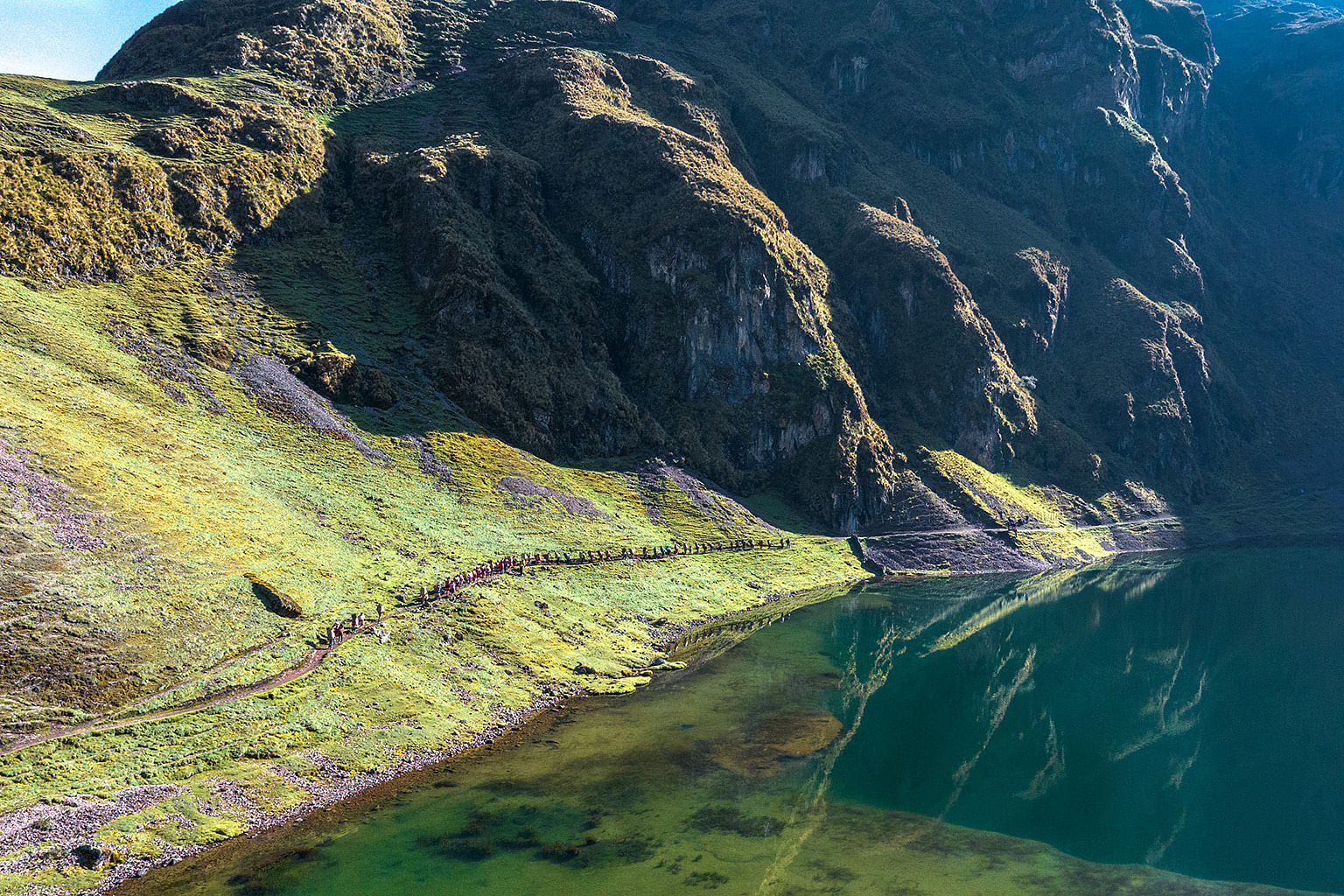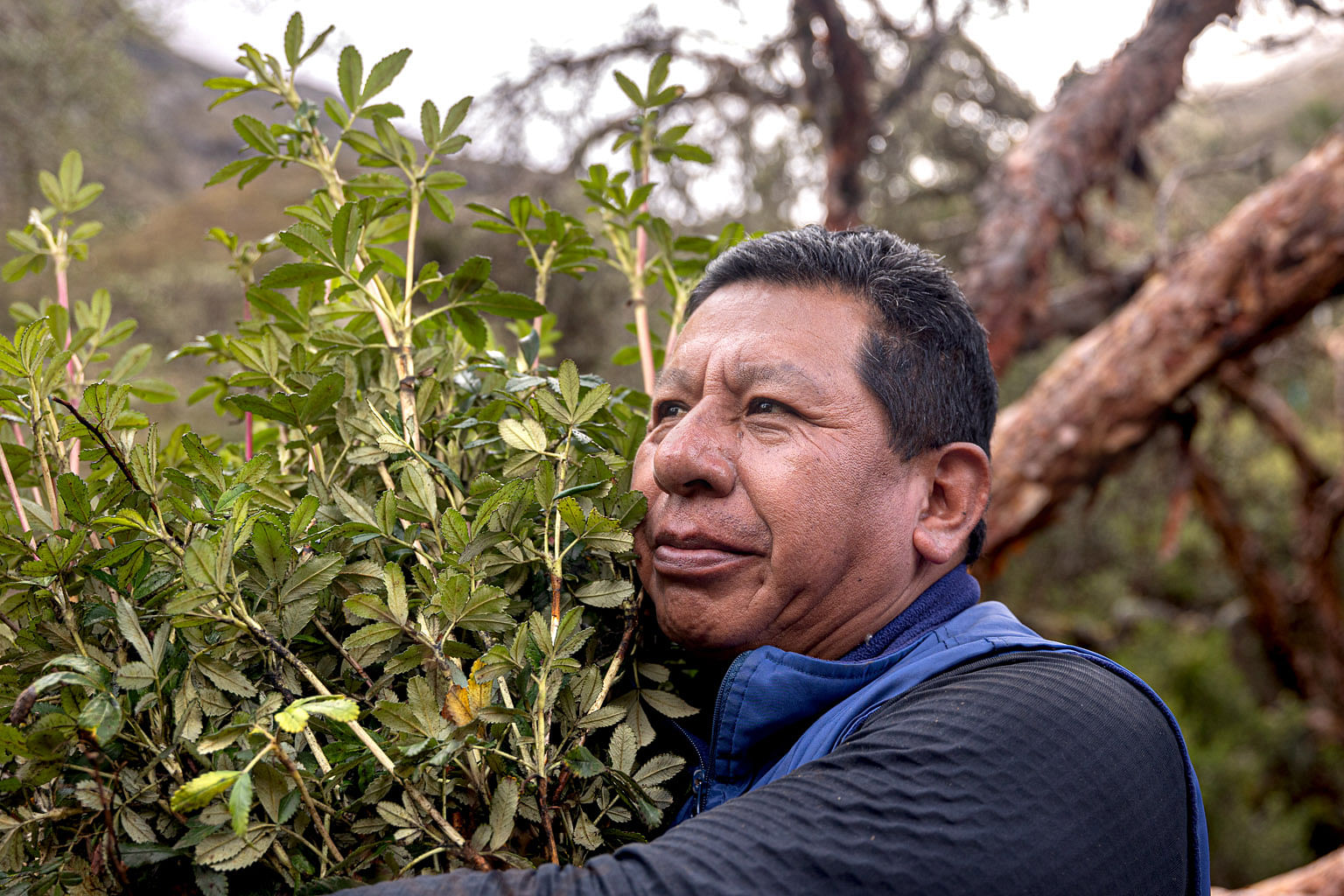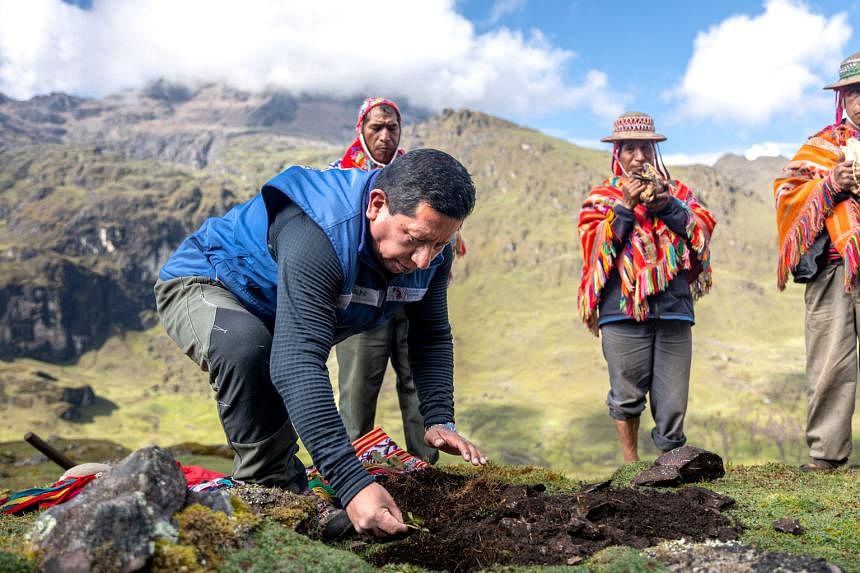If you have taken a walk in one of Singapore’s nature reserves and parks, you probably know the shelter and cooling that they can offer on a hot day, and may have even seen some of the animals that call the green spaces home. Such nature provides a variety of benefits to people and the environment.
High up in the Andes mountains that span several countries in South America, native forests serve many crucial functions too. They harbour more than 40 species of endangered animals, including the Andean condor and spectacled bear, and absorb mist from clouds, turning dry landscapes into wetlands and keeping streams flowing for nearby cities and communities.
However, with the expansion of farms, illegal logging, annual wildfires and other issues, these forests are being fragmented and placed under constant threat – and that is where Peruvian biologist Constantino Aucca Chutas comes in. He has been leading two organisations to regrow and protect the forests, both in Peru and across the mountain range.
His efforts, relying on partnerships with local communities to plant millions of trees, have won him numerous accolades, including being named a 2022 Champion of the Earth, the United Nations’ highest environmental honour. To support and expand his work, Swiss watchmaker Rolex has also selected him as one of its five 2023 Rolex Awards for Enterprise Laureates.
With the Rolex Award, Acción Andina, one of his two organisations, will be able to plant and grow an additional 3.5 million native trees across the five countries – Argentina, Bolivia, Chile, Ecuador and Peru – that host most of the high Andean forests, engage 30,000 families in ecosystem restoration activities, and preserve 10,000 ha of the forests.

The Award will also support local leadership development and capacity-building programmes for over 20 local conservation leaders, and maintain the traditional livelihoods of over 100 communities. Mr Aucca Chutas shares: “Winning this award will help us to achieve our main mission: To cover the highlands with trees and tackle the problems from climate change.
“We are planting millions of trees, and to plant millions of trees, we need a lot of help. Rolex is connected to the best people and to the best projects. With the Rolex Award, and by being part of the Rolex family now, we can continue to share our work with people all around the world and inspire them to act.”
Champion of the earth
For Mr Aucca Chutas, the drive to conserve the habitats has deep roots. As a descendant of indigenous Quechua farmers, he has a link to the Andes land that stretches back generations. When he was conducting fieldwork as a biology student more than 30 years ago and observed the Andean forests’ deterioration, he knew he had to step up and do something.
He started spearheading reforestation projects with local colleagues and people, eventually establishing the Asociación Ecosistemas Andinos (ECOAN) in 2000 to join forces with local communities and authorities to save Peru’s Andean ecosystems. Since then, it has planted 4.5 million native trees and created 16 protected areas across the Peruvian Andes.
In 2014, to mark the arrival of delegates to the United Nations Climate Change Conference in Lima, ECOAN worked with villagers in Peru’s Vilcanota Mountains to plant 57,000 indigenous Queuña trees in one day. The event was so successful that it became an annual tree-planting festival called the Queuña Raymi, which means “the festival of the Queuña tree”.
These trees absorb carbon dioxide and help to prevent landslides, among other contributions. Mr Aucca Chutas adds: “When we plant a tree, we give something back to Mother Earth. We are convinced that the more trees we plant, the more people will be happy. The festival is a celebration, a day of happiness.”
Its triumph also spurred him to team up with American non-profit organisation Global Forest Generation (GFG) to found Acción Andina in 2018. This has the wider-ranging goal of restoring and defending one million hectares of high Andean native forests in Argentina, Bolivia, Chile, Colombia, Ecuador, Peru and Venezuela by 2045.
He notes that as the Andes’ glaciers recede due to climate change, the forests will be even more important. They capture and store water from the melting ice and the clouds, releasing it slowly, helping to maintain the water cycle and supplying water to the communities below them, even during the dry season. “We need to plant trees along all the Andes to secure the water,” he says.
So far, Acción Andina has restored over 4,000 ha of the forests and safeguarded more than 11,000 ha, earning environmental awards such as the Earthshot Prize started by Britain’s Prince William, in 2023. GFG is also looking into replicating the Acción Andina model to secure other critically endangered and neglected ecosystems around the world.
Bringing communities together and empowering them
In both ECOAN and Acción Andina, Mr Aucca Chutas ensures that the work is driven by and for the Andes’ local and indigenous communities. His restoration model, which helps them to harvest forest products sustainably and maintain cultural traditions, centres the indigenous principles of ‘ayni’ and ‘minka’, meaning ‘reciprocity’ and ‘shared communal work’.

The two organisations train and empower local communities to plant trees, monitor parts of the forests and act as their stewards.His work is in line with the Rolex Perpetual Planet Initiative, launched in 2019, which assists people and organisations that tap on science and technology to understand and address the world’s environmental challenges.
The Initiative enables innovators to forge solutions to help solve the issues and restore natural ecosystems. It also has a growing portfolio of over 20 partnerships, including with Rewilding Chile to protect South America’s landscapes, Coral Gardeners to transplant resilient corals to reefs, and Great Spine of Africa expeditions to explore the continent’s major river basins.
The Rolex Awards are part of it too. Among the 160 Laureates so far are British-born marine biologist Emma Camp, who is studying ultra-tough, hardy corals to find ways to save damaged coral reefs, and American social entrepreneur Felix Brooks-Church, whose ‘dosifier’ machine adds micronutrients to staple foods to combat malnutrition.
Rolex also supports organisations and initiatives that foster the next generations of explorers, scientists and conservationists via scholarships and grants, such as the Our World-Underwater Scholarship Society and The Rolex Explorers Club Grants, as well as the Explorers Club’s Global Exploration Summit, where world-leading explorers gather annually.
For Mr Aucca Chutas, the idea of bringing local communities together is crucial to ECOAN and Acción Andina. He explains: “Once, we were united in South America by the Inca culture. The next time we came together to create a movement was to seek our independence. Now we’re coming together for the third time, for one tree: The Polylepis tree that makes up the forests.”
Through his work, he is also making his family proud. His grandparents, indigenous Quechua farmers, encouraged him to do more for the natural ecosystems critical to their livelihood. He says: “They told me, your name is Aucca Chutas, it means ‘warrior’. Please try to do something for us.” With that and sustainability in mind, he continues to push ahead to save the forests.
We The Earth is a partnership between The Straits Times and Rolex and its Perpetual Planet Initiative. Mr Constantino Aucca Chutas, a 2023 Rolex Awards for Enterprise Laureate, is a stellar example of the many individuals who are doing their part to solve the issues Earth faces.

